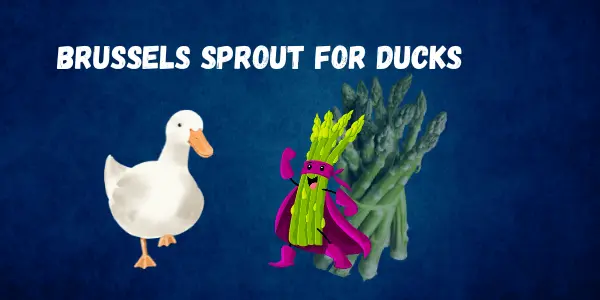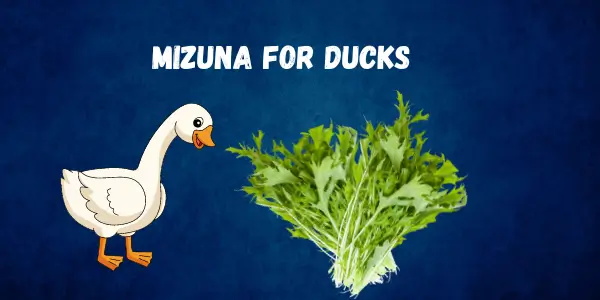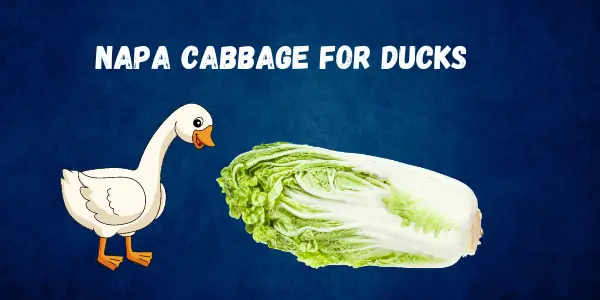Nutrition and Feeding Tips Of Can Ducks Safely Eat Brussels Sprouts
Published: 14 Sep 2024
Ducks can eat Brussels sprouts, but moderation is key. These vegetables provide essential nutrients but should not replace their primary diet. Both raw and cooked Brussels sprouts are options, but how they are prepared affects digestibility.
Can Ducks Eat Brussels Sprouts – Are Brussels Sprouts Safe for Ducks?
Yes, Brussels sprouts are generally safe for ducks when fed in small amounts. They are packed with vitamins and minerals that support overall health. However, overfeeding may cause digestive issues due to their fiber content. Chopping the sprouts into small pieces makes them easier for ducks to eat and digest.

Nutritional Value of Brussels Sprouts for Ducks
Brussels sprouts contain important nutrients that can support a duck’s health. They are rich in vitamins, minerals, and fiber, making them a beneficial occasional treat.
Vitamins and Minerals in Brussels Sprouts
Brussels sprouts contain:
- Vitamin C – Supports the immune system.
- Vitamin K – Helps with blood clotting and bone health.
- Vitamin A – Essential for vision and feather health.
- Calcium – Strengthens bones and eggshells.
- Fiber – Aids digestion but should be fed in moderation.
How Brussels Sprouts Benefit a Duck’s Diet
Feeding ducks Brussels sprouts in small amounts can provide:
- Better digestion – Due to their fiber content.
- Stronger immunity – Thanks to antioxidants like vitamin C.
- Healthier feathers and skin – Due to vitamin A.
- Improved bone health – From calcium and vitamin K.
Despite these benefits, Brussels sprouts should only be a minor part of a duck’s diet.
What types of Brussels Sprouts Do Ducks Eat?
Can Ducks Eat Raw Brussels Sprouts?
Yes, ducks can eat raw Brussels sprouts, but they should be chopped into small pieces to prevent choking. Raw sprouts are more fibrous, which may be harder to digest in large amounts. Ducks might prefer softer vegetables, so if they reject raw sprouts, consider cooking them.
Can Ducks Eat Cooked Brussels Sprouts?
Cooked Brussels sprouts are easier for ducks to digest. However, they should be plain, without salt, butter, or seasonings, as additives can harm ducks. Steaming or boiling is the best method to soften them while keeping their nutrients intact. Avoid overcooking, as excessive heat can reduce vitamin content.
Can Ducks Eat Brussels Sprout Leaves?
Yes, ducks can eat Brussels sprout leaves. The leaves contain similar nutrients to the sprouts but are easier to chew and digest. They can be fed raw or lightly steamed. Always ensure the leaves are pesticide-free before offering them to ducks.
Can Ducks Eat Brussels Sprouts in the Winter?
Yes, ducks can eat Brussels sprouts in the winter. These vegetables provide essential nutrients when fresh greens are scarce. Since winter limits access to natural food sources, offering Brussels sprouts can supplement their diet. However, ducks still need a balanced diet, including grains, proteins, and other vegetables.
Cold temperatures can make raw sprouts harder to chew. Chopping them into smaller pieces or lightly steaming them can make them easier to eat. Avoid frozen or spoiled sprouts, as they can cause digestive issues.
Can Ducks Eat Brussels Sprouts and Carrots Together?
Yes, ducks can eat Brussels sprouts and carrots together. Both are nutritious and provide essential vitamins and minerals. Carrots offer vitamin A, which supports eye health, while Brussels sprouts provide fiber, vitamin C, and calcium.
When feeding these vegetables together:
- Chop them into small pieces to prevent choking.
- Serve raw or lightly steamed for better digestion.
- Avoid seasoning, butter, or oils.
Brussels sprouts and carrots should only be occasional treats, not a main food source.
Can Ducklings Eat Brussels Sprouts?
Ducklings can eat Brussels sprouts, but only in very small amounts. Their digestive systems are still developing, making high-fiber foods harder to process.
If feeding ducklings Brussels sprouts:
- Cut them into tiny pieces or mash them.
- Offer them occasionally, not as a regular food.
- Ensure they are getting proper duckling feed, which provides essential nutrients for growth.
Steamed Brussels sprouts are a better option for ducklings than raw ones, as they are softer and easier to digest.
How to Feed Brussels Sprouts to Ducks
Feeding in Moderation and Portion Size
Brussels sprouts should only be a small part of a duck’s diet. Too much fiber can cause digestive discomfort. A few small pieces per feeding are enough.
Recommended portion:
- Adult ducks: A few chopped or shredded sprouts 2–3 times per week.
- Ducklings: A tiny amount, once a week, mixed with other soft foods.
Always observe ducks for any signs of digestive issues after introducing new foods.
Best Ways to Prepare Brussels Sprouts for Ducks
To make Brussels sprouts safe and enjoyable for ducks:
- Raw: Chop into small pieces to prevent choking.
- Steamed or boiled: Lightly cook without salt or seasonings to soften them.
- Shredded: Easier for ducks to pick and digest.
- Mixed with other vegetables: Combine with leafy greens or carrots for variety.
Avoid feeding ducks spoiled, moldy, or heavily processed Brussels sprouts, as these can cause health issues.
Potential Risks of Feeding Ducks Brussels Sprouts
While Brussels sprouts offer nutritional benefits, feeding them in large amounts can cause issues. Ducks have sensitive digestive systems, and certain compounds in Brussels sprouts may not be ideal for frequent consumption.
Oxalic Acid and Its Effects on Ducks
Brussels sprouts contain oxalic acid, which can interfere with calcium absorption. Ducks require calcium for strong bones and eggshell formation. High oxalic acid intake may lead to:
- Weaker eggshells in laying ducks.
- Bone density loss over time if Brussels sprouts are overfed.
Feeding Brussels sprouts occasionally and balancing them with calcium-rich foods like crushed eggshells or oyster shells can prevent these issues.
Digestive Concerns and Overfeeding Issues
Brussels sprouts are high in fiber, which can be difficult for ducks to digest in large quantities. Overfeeding may lead to:
- Bloating or gas due to fermentation in the digestive tract.
- Soft or watery droppings, signaling digestive distress.
- Reduced appetite for their primary diet, which is essential for balanced nutrition.
To prevent these problems, Brussels sprouts should only be an occasional treat, chopped into small pieces or lightly steamed for easier digestion.
FAQs About Ducks Eating Brussels Sprouts
No, Brussels sprouts should be an occasional treat, not a daily food. Too much fiber and oxalic acid can cause health issues.
Raw and cooked Brussels sprouts are both safe, but lightly steaming them makes them easier to digest. Avoid using salt, butter, or oils.
The stems are tough and difficult to chew. It’s best to remove them or chop them into small pieces if offering them.
Brussels sprouts are healthy, but ducks need variety. Leafy greens, carrots, peas, and grains provide a more balanced diet.
Conclusion: Should You Feed Ducks Brussels Sprouts?
Yes, ducks can eat Brussels sprouts in moderation. These vegetables provide important vitamins and minerals, but too much can cause digestive discomfort and affect calcium absorption.
To safely feed ducks Brussels sprouts:
✔ Offer small portions, 2–3 times per week.
✔ Chop raw sprouts or steam them for easier digestion.
✔ Avoid feeding large amounts to prevent bloating.
✔ Balance with calcium-rich foods and a diverse diet.
Brussels sprouts are a nutritious addition, but variety is key to keeping ducks healthy. Always monitor their response when introducing new foods.

- Be Respectful
- Stay Relevant
- Stay Positive
- True Feedback
- Encourage Discussion
- Avoid Spamming
- No Fake News
- Don't Copy-Paste
- No Personal Attacks

- Be Respectful
- Stay Relevant
- Stay Positive
- True Feedback
- Encourage Discussion
- Avoid Spamming
- No Fake News
- Don't Copy-Paste
- No Personal Attacks





